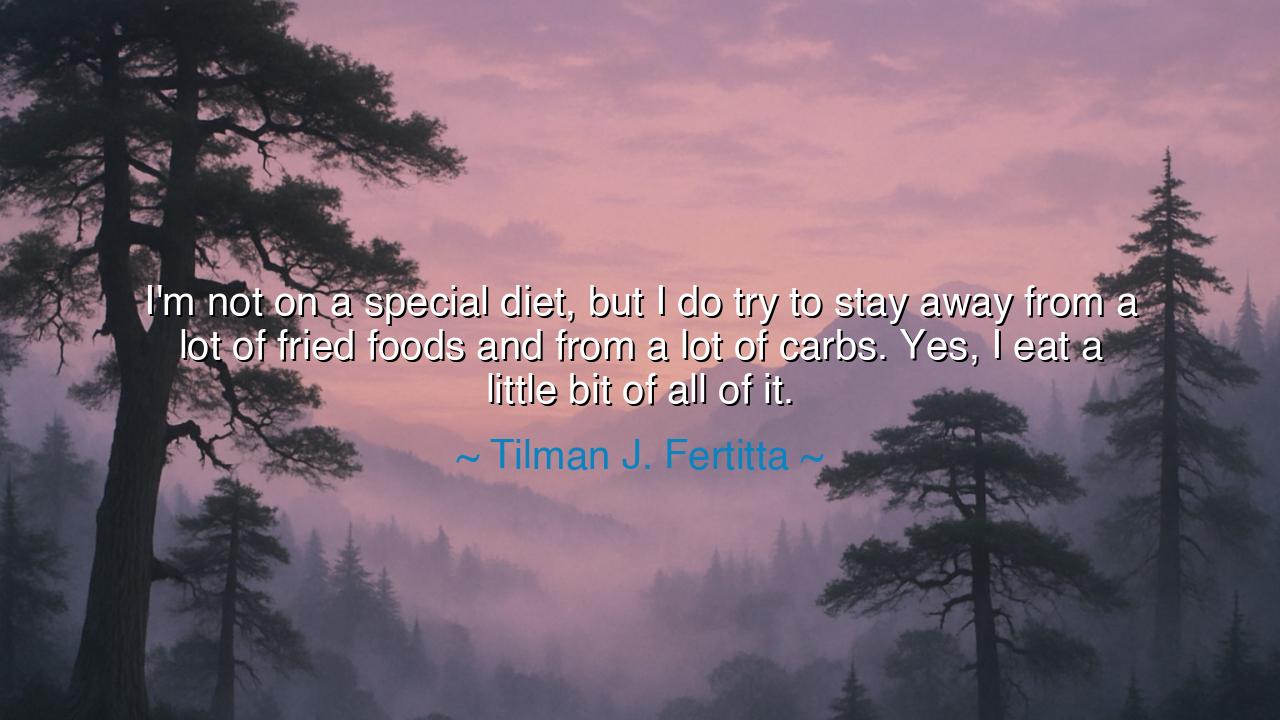
I'm not on a special diet, but I do try to stay away from a lot
I'm not on a special diet, but I do try to stay away from a lot of fried foods and from a lot of carbs. Yes, I eat a little bit of all of it.






When Tilman J. Fertitta said, “I’m not on a special diet, but I do try to stay away from a lot of fried foods and from a lot of carbs. Yes, I eat a little bit of all of it,” he spoke with the calm wisdom of one who understands the art of balance — a principle as old as civilization itself. His words are not those of denial, but of moderation, the timeless path that lies between indulgence and deprivation. Beneath their simplicity lies the essence of a truth the ancients long knew: that the key to health, strength, and longevity is not found in extremity, but in harmony — in the quiet mastery of one’s desires rather than the rejection of them.
The origin of this wisdom can be traced to the philosophy of temperance, one of the oldest virtues praised by sages and thinkers. From the Stoics of Greece to the Confucian scholars of China, all agreed that man’s greatness lies not in his ability to conquer the world, but to govern himself. Fertitta’s words reflect this ancient understanding: to enjoy “a little bit of all of it” is to live freely, yet wisely; to partake in life’s pleasures, yet not be ruled by them. For food, like power, wealth, or desire, can nourish or destroy depending on how it is used. Thus, he reminds us — not through theory but through practice — that self-restraint, not abstinence, is the truest form of freedom.
In the days of Plato, it was said that the body is the chariot of the soul, and that to guide it well, one must neither starve the horse nor overfeed it. The philosopher taught that excess dulls the spirit, while deprivation weakens it. Fertitta’s avoidance of “a lot of fried foods and carbs” mirrors this principle. He does not condemn pleasure, but he curates it. Like a wise ruler, he allows his senses their due joy, but never permits them to overthrow reason. To eat a little of everything — but not too much of anything — is to honor the body without enslaving it. It is the practice of a man who seeks longevity through balance, not perfection through rigidity.
Consider the story of King Cyrus of Persia, who, despite his great power and wealth, lived with moderation. It is said that even at his royal banquets, he ate sparingly and preferred simple foods grown in his gardens. When asked why he did not indulge more, he replied, “The one who knows when to stop eating also knows when to stop conquering.” So too does Fertitta, a modern titan of industry, understand this ancient truth. To succeed in business or in health, one must master the discipline of enough — to know that abundance is not license for excess, but a test of self-control.
The deeper wisdom of Fertitta’s words lies in their humility. In saying, “I’m not on a special diet,” he rejects the illusion that health requires fanaticism or exclusivity. The world today is full of extremes — one diet forbidding what another exalts, one voice preaching purity while another praises indulgence. But Fertitta’s tone is steady, grounded, human. He speaks for the middle path, the golden mean that Aristotle called the essence of virtue. To eat with mindfulness rather than obsession, to make choices not out of fear but out of understanding — this is the mark of a man who knows that sustainability is stronger than sacrifice.
Even in the ancient texts of the East, the Buddha spoke of the Middle Way — a life neither ascetic nor indulgent. He had fasted to the brink of death before realizing that true enlightenment could not come from starvation, but from balance. Fertitta’s philosophy of eating “a little bit of all of it” is an echo of that teaching in the modern tongue. It is a reminder that joy and discipline are not enemies, but allies — that the way to health, and indeed to a full life, is found not in rejection, but in moderation infused with mindfulness.
Let this, then, be your lesson: do not make war against food, nor surrender to it. Eat what nourishes, but also what brings joy — in proportion, in gratitude, in awareness. Learn to listen to your body as the ancients listened to the seasons, knowing when to feast and when to rest. Avoid what clouds the mind or burdens the flesh, yet savor the flavors that remind you you are alive. For as Tilman J. Fertitta teaches, the true measure of wisdom is not how much we deny ourselves, but how well we live in balance.
So, my children of appetite and abundance, remember this truth: the one who eats with wisdom eats with peace. Health is not a prison, but a practice — not a punishment, but a way of harmony. To live by moderation is to live by the rhythm of life itself: steady, joyful, enduring. And in that balance lies not only the secret of a long life — but the secret of a contented soul.






AAdministratorAdministrator
Welcome, honored guests. Please leave a comment, we will respond soon